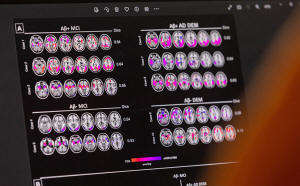About 4% of US adults age 65 and older have a dementia diagnosis, survey
finds
 Send a link to a friend
Send a link to a friend
 [June 13, 2024]
By Christy Santhosh [June 13, 2024]
By Christy Santhosh
(Reuters) - Some 4% of U.S. adults aged 65 and older say they have been
diagnosed with dementia, a rate that reached 13% for those at least
85-years old, according to a report of a national survey released on
Thursday.
The report issued by the U.S. Centers for Disease Control and Prevention
(CDC) was based on the 2022 National Health Interview Survey, a
nationally representative sample of U.S. adults aged 18 and older. The
survey in 2019 added the option to report dementia, including
Alzheimer's disease, to its questions on doctor-diagnosed health
conditions.
The CDC said 1.7% of adults ages 65 to 74 reported a dementia diagnosis,
a rate that increased with age. For those ages 75 to 84, the reported
dementia rate was 5.7%
The agency conducted in-person or telephone interviews with 8,757 people
age 65 and older who were asked whether they have been diagnosed with
some form of dementia.
Ellen Kramarow, the report's lead author, said dementia diagnosis
estimates were in general similar from 2019 to 2022, adding that they
"do not see this as a measure that is going to have large changes year
to year."
Alzheimer's is the leading cause of dementia, which involves the loss of
memory, language, problem-solving and other cognitive abilities severe
enough to interfere with daily life, according to the Alzheimer's
Association.

[to top of second column]
|

A scientist looks at hypometabolic and hypoperfusion patterns at the
single-subject level from a patient suffering from Alzheimer's
disease at the Memory Centre at the Department of Readaptation and
Geriatrics of the University Hospital (HUG), in Geneva, Switzerland,
June 6, 2023. REUTERS/Denis Balibouse
 The report accompanies the arrival
of new treatments designed to slow progression of the mind-wasting
disease, such as Biogen and Eisai's Leqembi, which won U.S. approval
last July. Eli Lilly's similar treatment, donanemab, was unanimously
endorsed by an advisory panel to the U.S. Food and Drug
Administration on Monday and is widely expected to be approved.
The CDC report showed dementia diagnoses were lowest among people
with college degrees and highest among people with less than a high
school education.
Several studies have suggested that people with higher levels of
education have larger cognitive reserves that can temporarily delay
dementia symptoms.
The overall estimates are similar to other national surveys, such as
the 2021 Medicare Current Beneficiary Survey, which estimated that
nearly 3% of Medicare beneficiaries not residing in nursing homes or
long-term care facilities had a diagnosis of Alzheimer's or another
type of dementia.
(Reporting by Christy Santhosh in Bengaluru; Editing by Bill
Berkrot)
[© 2024 Thomson Reuters. All rights reserved.]This material may not be published,
broadcast, rewritten or redistributed.
Thompson Reuters is solely responsible for this content. |